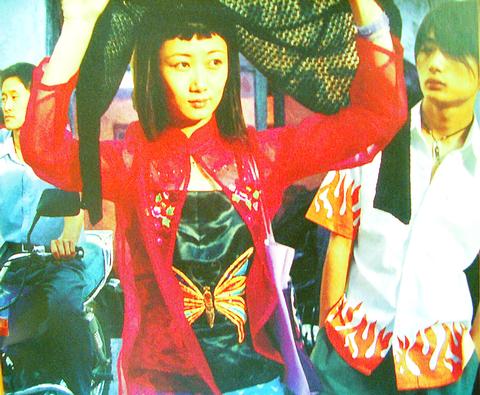Last year was very distinctive for both director Jia Zhangke (
"That year, reality was more theatrical than most films," said Jia, talking about his Cannes competition film Unknown Pleasure (任逍遙).

PHOTO COURTESY OF JIA ZHANKE
In the film, these actual events serve as the background for the stories of three aimless young characters in the remote provincial town of Tatung. A reflection on China in the wake of modernization, the subject matter is nothing new to Chinese films. But Jia, 32, offers a fresh and distinctive style. Using his camera to poetically observe people and reveal their humanity, his three most acclaimed works have made his talent recognized internationally. Unknown Pleasure, which was produced by a Chinese-Japanese team with Japanese, French and Korean financing, was the only Chinese-language film competing at this year's Cannes Festival.
The film project began as a documentary shooting in Tatung, Shanxi Province, Jai said. "At first it was the bleak and lonely buildings that attracted me. When I saw the streets filled with lonely, directionless people, I became interested in them," Jia said at a press conference last week.
According to Jia, because of Beijing's one-child population control policy, "they have no brothers and sisters, and often feel lonely."
Unknown Pleasure, pronounced "ren xiao yao" in Mandarin, tells a tale of solitude. Jobless slackers Xiao Ji (Wu Qiong,
"I was born in 1970 at the end of the Cultural Revolution when China was beginning to develop. But for the new generation, the development is nothing new. A new way of living and new values are available and have been spread fast by the media. Yet for a lot of people, the change in living conditions has been much slower than national development. This expanding gap created a lot of pressure ... on these young people," Jia said.
Having had previous films screen at both the Berlin Film Festival, (Xiao Wu, 1997) and the Venice Film Festival, (Platform, 2000), Jia this time makes a step forward to Cannes, competing for the Palm d'Or. But his film style remains the same.
Unknown Pleasure relies more on images than plot. Jia and cinematographer Yu Lik-wai (
"I have a particular preference for long takes because it allows you to feel time in the film," Jia said. "Other Chinese directors ... have explored a lot in cinematography. And I feel that time has not been explored," he said. "I like to gaze at ordinary people. By gazing for a long time, you don't need to ask what they're doing, what they've been through, you can feel that time is sculpting this person," he added.
Jia's perspective and film style is reminiscent of Taiwanese filmmaker Hou Hsiao-hsien (
"It is true that the spirit of his films has inspired me a lot," Jia said. He said his favorite of Hou's film is All the Youthful Days (
Challenging the status quo always involves risk. None of Jia's films have been permitted to screen in China, although pirated VCDs of all of them are widely available. "I am waiting. Time will solve this problem," Jia said casually.
He shouldn't worry. With international credentials and a ticket to Cannes, Jia will find audiences in Japan, France, Korea and, of course, Taiwan.

March 10 to March 16 Although it failed to become popular, March of the Black Cats (烏貓進行曲) was the first Taiwanese record to have “pop song” printed on the label. Released in March 1929 under Eagle Records, a subsidiary of the Japanese-owned Columbia Records, the Hoklo (commonly known as Taiwanese) lyrics followed the traditional seven characters per verse of Taiwanese opera, but the instrumentation was Western, performed by Eagle’s in-house orchestra. The singer was entertainer Chiu-chan (秋蟾). In fact, a cover of a Xiamen folk song by Chiu-chan released around the same time, Plum Widow Missing Her Husband (雪梅思君), enjoyed more

Last week Elbridge Colby, US President Donald Trump’s nominee for under secretary of defense for policy, a key advisory position, said in his Senate confirmation hearing that Taiwan defense spending should be 10 percent of GDP “at least something in that ballpark, really focused on their defense.” He added: “So we need to properly incentivize them.” Much commentary focused on the 10 percent figure, and rightly so. Colby is not wrong in one respect — Taiwan does need to spend more. But the steady escalation in the proportion of GDP from 3 percent to 5 percent to 10 percent that advocates

From insomniacs to party-goers, doting couples, tired paramedics and Johannesburg’s golden youth, The Pantry, a petrol station doubling as a gourmet deli, has become unmissable on the nightlife scene of South Africa’s biggest city. Open 24 hours a day, the establishment which opened three years ago is a haven for revelers looking for a midnight snack to sober up after the bars and nightclubs close at 2am or 5am. “Believe me, we see it all here,” sighs a cashier. Before the curtains open on Johannesburg’s infamous party scene, the evening gets off to a gentle start. On a Friday at around 6pm,

A series of dramatic news items dropped last month that shed light on Chinese Communist Party (CCP) attitudes towards three candidates for last year’s presidential election: Taiwan People’s Party (TPP) founder Ko Wen-je (柯文哲), Terry Gou (郭台銘), founder of Hon Hai Precision Industry Co (鴻海精密), also known as Foxconn Technology Group (富士康科技集團), and New Taipei City Mayor Hou You-yi (侯友宜) of the Chinese Nationalist Party (KMT). It also revealed deep blue support for Ko and Gou from inside the KMT, how they interacted with the CCP and alleged election interference involving NT$100 million (US$3.05 million) or more raised by the